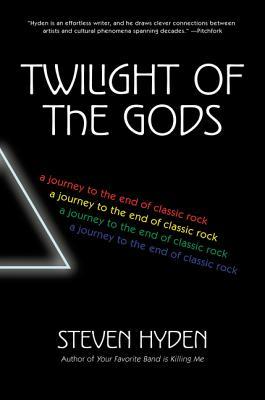More on this book
Community
Kindle Notes & Highlights
Jeff Stein’s classic 1979 documentary had built up the legend of the Who in my mind around the time I bought that Quadrophenia tape—this was a wild, combative band that annihilated hotel rooms and arena stages but always seemed to emerge from the chaos unscathed.
If you sold millions of albums, played arenas, and benefited from a major record label plying disc jockeys with cocaine and microwaves in order to get your music on the radio, you were classic rock.
I viewed rock the way Matt McConaughey saw time in the first season of True Detective, as a flat circle.
Garth was granted custody of the earnest singer-songwriter wing of heartland rock, and Shania Twain put a pop spin on the Def Leppard–AC/DC jock jams wing with the assistance of her husband, the producer Robert John “Mutt” Lange, the enigmatic sentient mullet who manned the boards for Back in Black and Pyromania.
The Origins and History of Consciousness.
By the time Ozzy was fired from Sabbath in 1979, he was viewed by his bandmates as a slobbering buffoon who couldn’t be relied upon, even given the band’s lax “slobbering buffoon” standards. (According
feel like playing Darkness on the Edge of Town or The River for the ten thousandth time. Come to think of it, Lucky Town is in fact much better than most people (even myself) give it credit for. Herein lies the third phase of the good “bad” album experience: brainwashing.
playing. He was eager to sublimate himself to the Dead myth, in the service of making people forget that Jerry was gone and they were actually listening to a man with a racist penis.
the sci-fi make-out ballad “Come Sail Away,” became a hit. When I say “wined and dined,” of course I really mean “supplied drugs and microwave ovens as payola.”
“We would have a pocket full of, you know, fun-powder, and cash, and we just went around and did everything that we could to get this song on the radio,” he said. “We had big plans for that song, so we just went at it like a kamikaze: ‘We are going to get this on the radio or we are going to die trying.’ We went coast to coast and gave away TV sets and VCRs and promised this and that—plane tickets, anything—and we got the bullet back.” You aren’t going to get juicy information like that while talking with the dudes from Twenty One Pilots.
I live by one rule: When documentaries are made in forty years about the present day, you don’t ever want to be on side of those pushing against history. Rather, you want to be aligned with those who are trying to move the world forward a couple of inches. Therefore, blowing up records for the amusement of musical bigots will never be a tenable position.
The ones I like—Widespread Panic, Gov’t Mule, Chris Robinson Brotherhood—are obvious descendants of the Grateful Dead as well as the Allman Brothers Band, eternal godfathers of the jam-band scene’s Southern wing.
Also, the Dead did not exude energy. They were capable of rocking, but only until about 1982.
(Grown-ups in the sixties apparently hated it when young people danced in circles.)


